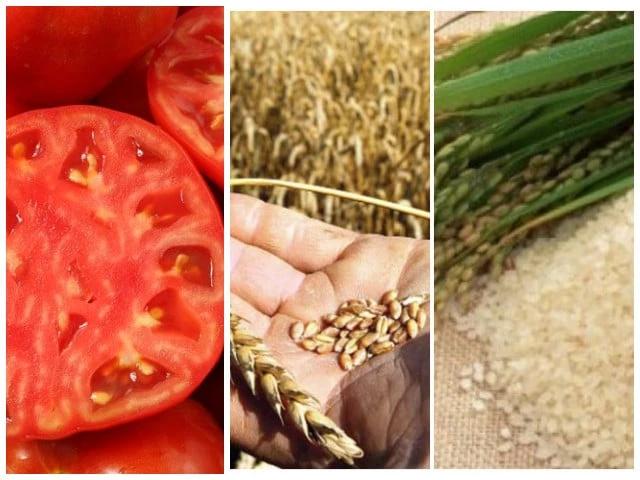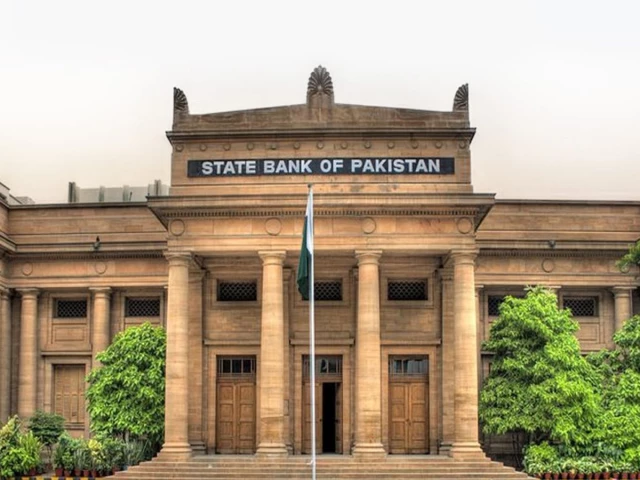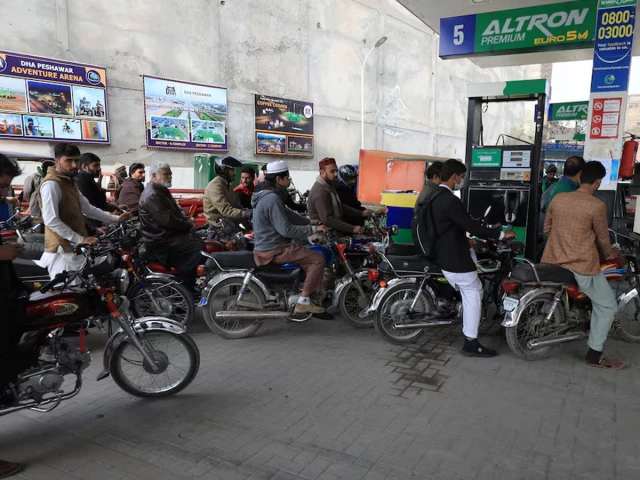Business
Food prices push yearly SPI to 35-week high | The Express Tribune

KARACHI:
Pakistan’s weekly inflation, measured by the Sensitive Price Indicator (SPI), week ending Sep 04, 2025, increased by 1.29% week on week (WoW) and up 5.07% year on year (YoY), which is the highest YoY after 35 weeks.
Major increase was observed in the prices of tomatoes, wheat flour, onions, rice basmati broken, garlic, potatoes.
“Pakistan’s Weekly SPI for the period ending Sep 04, 2025, increased by 1.29% WoW while up 5.07% YoY, which is the highest YoY after 35 weeks,” noted Topline Securities.
The SPI rose by 1.29% for the combined consumption groups during the week ended September 4, 2025, according to data released by the Pakistan Bureau of Statistics (PBS). The SPI was recorded at 335.41 points compared to 331.14 points in the previous week. On a year-on-year basis, the SPI registered an increase of 5.07%, the highest annual rise in 35 weeks, reflecting renewed price pressures in essential commodities.
The PBS noted that the inflationary burden was more pronounced for lower-income households. For the lowest consumption group with monthly expenditure by 2.01% to 327.73 points, while other quintiles recorded weekly rises of 1.90%, 1.61%, 1.48%, and 0.99% respectively. This indicates that households in the lower-income brackets continue to bear the brunt of price hikes, particularly in food essentials that form a larger share of their consumption basket.
Out of the 51 essential items monitored, the prices of 23 items or 45.10% increased, 4 items or 7.84% declined, while 24 items or 47.06% remained stable during the week under review. The steepest weekly increases were observed in the prices of tomatoes, which soared 46.03%, followed by wheat flour at 25.41%and onions at 8.57%. Other notable increases included rice basmati broken at 2.62%, garlic at 2.04%, potatoes at 1.38%, pulse moong at 1.29%, and bread at 1.19%. Non-food categories also saw moderate increases, with LPG rising by 0.88%, shirting by 0.27%, long cloth by 0.17%, and lawn printed by 0.07%. In contrast, bananas declined by 3.86%, diesel by 0.91%, sugar by 0.13%, and mustard oil by 0.10%, offering limited relief.
On a yearly basis, several items remained significantly higher than last year. Tomatoes registered the steepest jump at 83.45%, followed by ladies’ sandals at 55.62%, wheat flour at 30.27%, and gas charges for Q1 at 29.85%. Prices of sugar rose 27.43%, while gur, beef, pulse moong, firewood, vegetable ghee, and chicken all recorded double-digit increases. Lawn printed also edged higher by 7.72%, adding to household expenses. On the other hand, major yearly declines were recorded in onions, which fell 47%, garlic at 25.50%, pulse mash at 22.93%, potatoes at 19.25%, and pulse gram at 19.04%. Other notable declines included electricity charges for Q1 at 18.12%, tea packet at 17.93%, pulse masoor at 6.07%, rice IRRI-6/9 at 4.60%, and LPG at 3.71%.
Analysts point out that while weekly inflation is largely being driven by volatility in perishable food items such as tomatoes and wheat flour, the broader year-on-year jump raises concerns about persistent cost-of-living pressures. With inflation hitting its highest yearly spike in over eight months, the government faces a growing challenge in protecting lower-income households from food price shocks.
Business
D-St blues! Sensex sheds 1.5K, biggest drop on a Budget day – The Times of India

At a time when global markets are witnessing high volatility due to geopolitical uncertainties, the hike in securities transaction tax (STT) on derivatives trades hit investor sentiment on Dalal Street on the Budget day. This in turn led to a sharp sell-off that pulled the sensex down by nearly 1,500 points—its biggest points loss on a Budget day—to close at 80,773 points. The sell-off also left investors poorer by Rs 9.4 lakh crore, the biggest Budget day loss in BSE’s market capitalisation.The day’s trading was marked by high volatility. The sensex rallied over 400 points as FM started her speech, fell about 1,100 points after the STT hike proposal was announced, partially recovered by mid-session to trade 600 points down on the day and then sold-off to close below the 81K mark for the first time in four months.On the NSE, Nifty too treaded a similar path to close 495 points (2%) lower at 24,825 points. Fund managers and market players feel the day’s sell-off was overdone, compounded by the absence of most institutional players since it was a Sunday. “The market’s reaction (to the hike in STT rates) was a bit overdone, although the decision itself was unexpected,” said Taher Badshah, President & Chief Investment Officer, Invesco Mutual Fund. “I think markets should settle down in 2-3 days.” Badshah said the Budget was in line with govt’s set path of the past few years, showing a conservative approach to setting targets.“The revenue and expenditure targets for FY27 are achievable. And since the rate of inflation is lower now, the nominal GDP growth rate of 10% may turn out to be on the higher side as inflation normalises during the year,” the top fund manager said. In Sunday’s market, of the 30 sensex stocks, 26 closed in the red. Among index constituents, Reliance Industries, SBI and ICICI Bank contributed the most to the day’s loss. Buying in software services majors Infosys and TCS cushioned the slide. In all, 2,444 stocks closed in the red compared to 1,699 that closed in the green, BSE data showed.STT hike aimed at curbing F&O speculation The decision to raise securities transaction tax (STT) for trading in equity derivatives means trading futures & options (F&O) will be more expensive from April 1. STT on futures trading rises from 0.02% to 0.05% now, and on options premium and exercise of options to 0.15% from 0.1% and 0.125% respectively. This could more than double statutory costs of trading F&O contracts.While the move is to curb excessive speculation by retail traders who mostly suffer losses, investors sold stocks of those companies that derive a large portion of their turnover from this segment. Stock price of Angel One crashed nearly 9%, BSE crashed 8.1%, Billionbrains Garage Ventures that runs the Groww trading platform, lost 5.1% and Nuvama Wealth Management lost 7.3%. STT hike follows a Sebi survey that showed that 91% of the retail investors lost money in the F&O market with average loss per investor surpassing Rs 1 lakh per year. Institutional and some high net worth players took home most of the profits from the segment.18% GST on brokerage for FPIs removedThe Budget proposed to do away with 18% GST charged on the brokerage that foreign portfolio investors pay in India. Among the host of changes to the GST laws that the finance minister proposed, one was abolishing clause (b) of sub-section (8) of section 13 of the Integrated Goods and Services Tax Act, 2017. This is being “omitted so as to provide that the place of supply for ‘intermediary services’ will be determined as per the default provision under section 13(2) of the IGST Act,” the Budget proposal said.
Business
Buying property from NRIs? Time to lose the TAN – The Times of India

Buying property from an NRI? Worried about obtaining TAN? Not anymore. To relax the compliance burden, the Budget has proposed that resident individuals and HUFs need not have a Tax Deduction and Collection Account Number (TAN) if they are purchasing a property from a non-resident Indian (NRI). The amendment will take effect from Oct 1, 2026.Under the proposed framework, resident individuals or HUFs can report the tax deducted at source (TDS) by quoting PAN, as is done when the transactions are between two residents. Presently, if a person buys an immovable property from a resident seller, the person is not required to obtain TAN to deduct tax at source. However, where the seller of the immovable property is a non-resident, the buyer is required to obtain TAN to deduct tax at source.Ameet Patel, partner at Manohar Chowdhry & Associates, said this used to be a detailed process. “At present, if a resident were to purchase an immovable property from an NRI, there is no separate relaxation regarding compliance with TDS responsibilities. As a result, in such cases, the buyer needs to obtain a TAN, register on the portal, and then deduct TDS u/s. 195, and pay to the govt. Under section 195, as with all other regular TDS sections, a quarterly e-TDS statement is required. A buyer would need professional help for all this.”Hinesh Doshi, CA, welcomed the move. “There used to be an unnecessary compliance burden due to this. While the process to obtain TAN is simple, people used to obtain TAN for just one transaction. So, this is a good riddance.”
Business
Harry Styles and Anthony Joshua among UK’s top tax payers

The former One Direction member-turned-solo artist appears on the Sunday Times list for the first time.
Source link
-

 Sports5 days ago
Sports5 days agoPSL 11: Local players’ category renewals unveiled ahead of auction
-

 Entertainment5 days ago
Entertainment5 days agoClaire Danes reveals how she reacted to pregnancy at 44
-

 Fashion1 week ago
Fashion1 week agoSpain’s apparel imports up 7.10% in Jan-Oct as sourcing realigns
-

 Business6 days ago
Business6 days agoBanking services disrupted as bank employees go on nationwide strike demanding five-day work week
-

 Tech1 week ago
Tech1 week agoICE Asks Companies About ‘Ad Tech and Big Data’ Tools It Could Use in Investigations
-

 Sports5 days ago
Sports5 days agoCollege football’s top 100 games of the 2025 season
-

 Politics1 week ago
Politics1 week agoFresh protests after man shot dead in Minneapolis operation
-

 Fashion1 week ago
Fashion1 week agoTurkiye cuts benchmark rate to 37%, flags confidence on inflation












